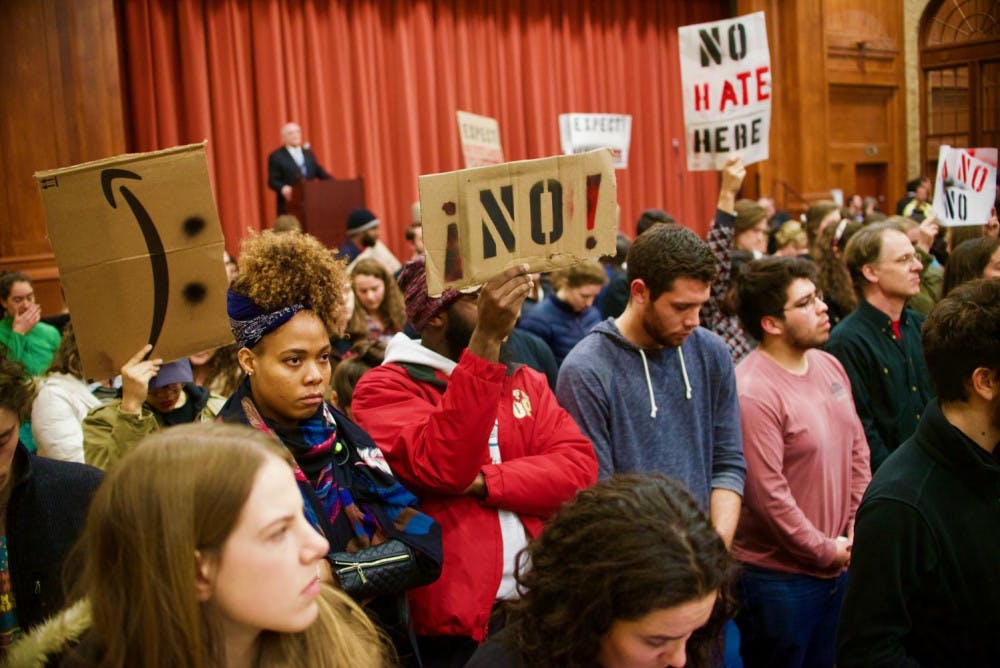Faculty could not agree to a nonbinding resolution that would have condemned students who obstruct speech they disagree with, deciding to postpone it until the fall. Instead professors approved a separate plan to have a “deliberative dialogue” on free speech, ensuring the Charles Murray saga extends into another school year.
The votes came at a three-hour faculty meeting on May 16 in Wilson Hall. There the faculty established a working group that would meet this fall to devise policies that promote “every community member’s freedom and full participation.” The plan made no official policy changes to protest rules or judicial processes. It delegated that task to the working group.
Several faculty said that committing to a “deliberative dialogue” amounted to a four-month delay of pressing matters.
“I don’t believe it is the appropriate time to go to bed on this issue,” said Michael Olinick, the math professor who introduced the tabled proposal. “I believe we’re doing our students a disservice without coming up with a statement of some substance about freedom of expression and its limits.”
The college handbook currently encourages students to express their opinions publicly and privately as long as they are “orderly” and non-disruptive. It bars students from holding up banners or making noise that prevents the audience from seeing or hearing a speaker. This section of the handbook was the basis for last semester’s disciplinary crusade in which Middlebury hired an independent investigator to identify student protesters for punishment.
“If we’re really concerned about freedom of speech then the students are the ones we should start with,” said Linus Owens, a sociology professor. “To the extent that we can vote on this while students are still being disciplined for their exercise of speech, I think is very soon — too soon.”
The professors who spoke gave contrasting definitions of “freedom of speech.” Some said student protesters who shouted down Charles Murray were the ones silenced by the school’s investigation, which concluded on May 23. Others said the concept specifically protects controversial speech.
“I’ve talked to many of my colleagues who come from an international background and for us the meaning of freedom of speech is not really that ambiguous,” said religion professor Ata Anzali, who is an Iranian national. “For many of us this is about how the situation can be easily flipped around against us.”
Anzali was held in Iran for several days in January after President Trump issued Executive Order 13769, commonly known as the travel ban. He referenced an incident in which Fordham University banned a pro-Palestine student group because it was deemed too controversial.
“I don’t see how voting on this now is going to change the discussion because we haven’t had the discussion yet,” said Patricia Saldarriaga, a professor of Spanish. She said the working group scheduled to meet this fall will be the place for debate.
Jason Mittell of the film department said there was no chance the faculty could all agree on Olinick’s proposal by the end of the meeting. “I feel like you’re not going to let us go to bed for the summer,” he said directly to Olinick. “This motion is encouraging the divisiveness to return.”
The faculty quickly debated a housekeeping measure that standardizes professional titles for non-tenured teachers. It passed with little fanfare, although a few professors asked to clarify whether they would be evaluated on research, teaching or both. The bill’s sponsors said that professors could choose one of those factors.
The faculty also announced that the Crest Room in the student center would be converted into a faculty lounge from 8 a.m. to 4 p.m. It will be available to students in the evenings, they said. The proposal did not specify whether the room would need to be renovated.
A proposal to certify a double major in education passed later by a near-unanimous vote. The major would be for students seeking licensure as elementary or secondary teachers. The education department will still provide a minor for students who aren’t seeking a teacher’s license. The changes are effective this fall term.
The faculty then voted unanimously to move into “executive session,” where President Laurie L. Patton gave closed-door remarks that lasted half an hour. Reporters were forced to leave the room.
Faculty rules say that discussions and actions in the executive session “will be held in confidence until released by proper authority.” But David Dorman, the faculty moderator, refused to release any information.
“No notes were taken during the executive session and no information was or is being released,” he said.
Faculty Punt on Free Speech

Comments



